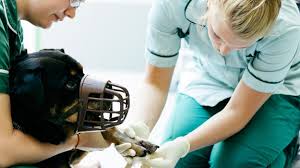What skills do you need to be a vet?
Being an animal doctor is a challenging, demanding and ultimately rewarding job. You’ll need to learn how to diagnose, treat and manage a variety of illnesses and conditions in many different species of animals. It’s a path that demands a great deal of compassion for both animals and for their owners and a background in the sciences.
Whether you have always wanted to work with animals or a mid-career change has you weighing your options, before registering for school you should assess exactly what skills you need to be a veterinarian.
What Does a Veterinarian Do?
Veterinarians may work in private practices, farms, zoos, shelters and animal hospitals. They care for a wide variety of animals, diagnose illness and injuries and provide education to pet owners on proper animal care and nutrition. They may care for domestic pets, livestock and wild or exotic animals. They often perform surgeries and contribute to research that helps animals and people.

Skills Needed to Become a Veterinarian
Veterinarians need to have a variety of skills to offer the best care possible to their patients and clients, including:
- Attention to detail: Veterinarians need to be methodical and analytical. They must be able to interpret data and think logically to diagnose illness and injury.
- Compassion: Veterinarians deal with people who may be distraught about a beloved pet’s death or illness. They must be able to empathize with an animal’s suffering and show care and compassion.
- Physical strength and stamina: Veterinarians need to lift and move animals during examinations and surgeries and stand for long hours.
- Technical and scientific aptitude: Veterinarians use technical machinery and have to interpret information from X-rays, reports and blood tests.
- Excellent communication skills: Veterinarians have to be able to describe sometimes complicated information to members of the public when they may be emotionally upset. They have to clearly explain home care instructions for medicine doses and follow up care in a way that pet owners will understand. They need to write detailed notes and often give their expert opinions in presentations, speeches and reports.

Communication Skills:
Veterinary Assistants work on the frontlines connecting vets, pets and pet owners. Good communication skills help them send clear messages while listening carefully to pet owners’ questions and concerns. Vet Assistants are responsible for answering phone calls, booking appointments and providing pet owners with important animal care information.
An important part of joining a veterinary clinic or hospital is having good working relationships with the entire veterinary team. Your coworkers will include vets, vet technicians and other Veterinary Assistants. Having a good attitude can help make your interactions with others productive, and help keep everyone on the same page to avoid messy misunderstandings. Nonverbal communication is also important. A confident posture and a smile can go a long way!
Empathy Skills:
The best Veterinary Assistants know how to engage with pet owners in a genuine and respectful way. You must be able to interact with people from all walks of life and help them feel comfortable. Vet Assistants often encounter clients that are worried, or distraught about the health condition of their pets. It is a Vet Assistant’s duty to understand and sympathize with how the clients are feeling and offer reassurance and support.
Empathy skills can also help you work with the many animals that you’ll meet. By understanding their stress and fear, you can use a comforting, relaxed and assuring attitude to calm them down, which puts them in a safer position to receive treatment.

Passion for Animals
The most important skill is a passion for animals and a commitment to the health and well-being of animals. The future veterinarian cannot just own a dog or cat; he must have desire to care for the pet and keep it healthy and happy. Veterinarians must also have a natural curiosity about other species, such as domestic farm animals or exotic species that live in the wild.
Academic Competencies
All veterinarians need outstanding competency in math, science, language and research and a commitment to lifelong learning. They need to keep informed of new scientific developments, quickly understand new information on procedures and drugs, and how to use them appropriately when treating their patients. They must be willing to take continuing education classes and attend conferences in their areas of specialization. As with physicians for the human population, they need to read articles in veterinary journals, understand the benefits of new drugs and meet with representatives who provide new types of medical equipment and supplies for the clinic.
Stress Tolerance
Veterinary technicians must be calm in emotional situations. Veterinary technicians move back and forth between different sets of clients, with each set visiting the veterinarian for dramatically different reasons. Therefore, clients will be experiencing very different levels of emotion.
Respect for Authority
Veterinary medicine is not coded or regulated in the way that human medical practice is. There are multiple options for treating any ailment with each option having its own devoted supporters advocating for its use. While veterinarians consult with veterinary technicians frequently in the course of developing a treatment plan, the chain of command remains. A veterinary technician must be follow the veterinarian’s orders without argument or delay. It is imperative that veterinary technicians recognize and abide by the proper chain of command.